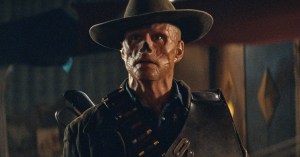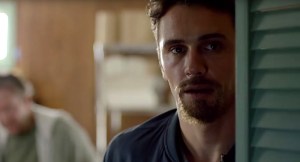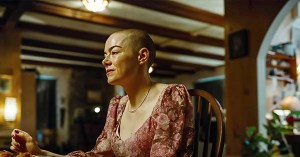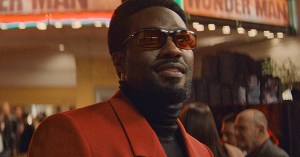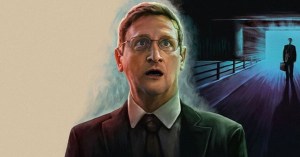Total Recall: Welcome to Coen Brothers Country
A look at the filmography of the two-headed writer-producer-director.
Before expanding wide on November 21,
No Country for
Old Men (90 percent) will play in select cities this Friday, riding a
wave of huge expectations. (RT dug it at Cannes!) The
Cormac
McCarthy-based thriller has made big splashes during festivals and it’s
touted as a major comeback for the
Coen Brothers.
What better time to look at the movies that have made the filmmaking siblings so
respected?
Even with seemingly multiplex-ready movies like
Intolerable
Cruelty (75 percent) and
The Ladykillers
(55 percent), Joel and Ethan Coen have rarely been boffo box office draws. But the
brothers release their movies with surprising regularity, and never seem to have
much problem getting projects off the ground. It’s probably because the duo
makes weird movies. But not too weird. The Coens are essentially genre
craftsmen — crime thrillers, neo-noirs, a stoner comedy here or there — who
finesse their movies with signature arch dialogue and a morbid, mannered sense
of humor. It’s an approach that limits box office but opens countless doors to
produce a loyal and rabid cult following. Here’s a trip through the filmography
of America’s most valued team of auteurs.
 Combining the shocks of a slasher film with the moral
Combining the shocks of a slasher film with the moral
ambiguity and twisty plotting of film noir, the Coens’ debut,
Blood Simple
(1984, 98 percent),
shook American independent cinema to its core. Creepy and deliriously
malevolent, its the story of a bar owner who hires a sketchy private eye to kill his
cheating wife (Frances McDormand); double and triple crosses and bloody mayhem
ensues. With their first film, the Coens show an aptitude for the stylistic
quirks that would become their trademark: the balancing the macabre with a loopy
sense of humor.

The first Coen
brothers film to display their knack for quirky comedy, 1987’s
Raising Arizona
(90 percent)
helped seal the filmmakers’ reputation and cement their loyal following.
Nicholas Cage and
Holly Hunter are brilliantly cast as a cop and ex-con
husband/wife who resolve their infertility with kidnapping. Though not their
biggest hit, it’s infinitely quotable ("Edwina’s insides were a rocky place
where my seed could find no purchase.") and original score by Carter Burwell is
not to be ignored.
 As an homage to classic gangster movies,1991’s
As an homage to classic gangster movies,1991’s
Miller’s
Crossing (90 percent) is hypercharged; the language is harsher, the violence
more brutal, the plotting more labyrinthine.
Albert Finney and
Gabriel Byrne
star as Irish mobsters, threatened externally by the Italian mob and internally
by their shared love of a woman (Marcia Gay Harden). In some ways, Miller’s
Crossing is the Coens’ most straightforward work; while it has a streak of
dark humor, it features impeccable 1920s décor and intriguing tale of loyalty
throughout.
 Legend has it the Coens had such a bad case of writer’s
Legend has it the Coens had such a bad case of writer’s
block while writing Miller’s Crossing that they took three weeks off to
script Barton Fink
(1991, 93 percent), a 1930s-set black comedy about — what else? — a
Hollywood scribe with writer’s block. A fledgling New York playwright who sells
out (at the cost of…his soul!) and moves to the City of Angels, Barton Fink
(played marvelously by Coen regular
John Turturro)
holes up in the seamy Hotel Earle, where exquisitely dismal wallpaper peels off
the walls as a heat wave sweats the city. The heat especially ramps up when
Barton’s gregarious neighbor (John
Goodman) is around; almost hellishly so, you might say. But as every
smart filmmaker is wont to do, the Coens offer no overt explanations of what’s
really going on — just a well-told tale with visual imagery aplenty, and an ode
to the sometimes infernal nature of the creative process.

The Coens spooned
doses of their trademark guileless humor on
The Hudsucker Proxy
(1994, 58 percent), a period office comedy-cum-Christmas tale.
Jennifer Jason-Leigh is pitch perfect in her role as post-war
career woman ("Do you think this suit looks mannish?") against
Tim Robbins‘s
hapless dreamer ("You know — for kids!"). Visionary in many ways, this film
deserves a better reputation than it’s garnered in its odd little sleeper life.

1996’s
Fargo (93 percent) is
the Coens’ most successful film to date, with seven Oscar nominations and two wins:
Best Actress (Frances McDormand) and Best Original Screenplay. Fargo details a
ransom kidnap scheme gone wrong, with very pregnant cop McDormand investigating
the crime as the bumbling perpetrators attempt to cover their tracks. The Coens’
bleak humor and taste for blood and violence never mixed as well as it did in
Minnesota.

Though many of the
Coens’ films can be labeled cult classics, perhaps none embody the term moreso than The Big Lebowski
(1998, 74 percent).
Jeff Bridges
stars as pot smoking slacker hero Jeffrey "The Dude" Lebowski, who seeks restitution for his rug, urinated on by a pair of gangsters who
mistook him for a different Lebowski — namely, the “big” one (played by Charles Durning). Along with his bowling buddies, The Dude
embarks on a wild chase that’s as funny, depraved, and plain unpredictable as
Los Angeles always feels like it should be.
 With
With
O Brother, Where Art Thou?
(2000, 79 percent), the Coen brothers took
their thriller tropes (ill-fated criminal plans, ironic stereotypes, and a detached
tone) and magically applied it towards an Odyssey-inspired farce. Starring
George Clooney as the beleaguered but resourceful Odysseus,
O Brother is a
sepia-toned fantasia of throwaway jokes, slapstick, and killer bluegrass. In
fact, the music proved popular enough to spawn a virtual cottage industry with
multiple soundtracks, a documentary, and even a national tour.
 Though the brothers have flirted with the shadowy realms of
Though the brothers have flirted with the shadowy realms of
film noir, 2001’s
The Man Who Wasn’t There
(79 percent) is the closest they come to making a
headlong plunge into the genre.
Billy Bob Thornton stars as a classic fall guy,
and playing the character as a deeply emotionally repressed square, Thornton is
at his most controlled, wringing pathos out of an increasingly dire scenario.
Featuring sharp, evocative black and white cinematography and an excellent
supporting cast, The Man Who Wasn’t There is an existential nightmare
replete with odd touches and arguably the brothers’ most emotionally pained
work.
Demonstrating that their penchant for screwball comedy was not limited to marginal environments or period-piece conceits, the Coens set Intolerable Cruelty (2003, 75 percent) in no less a setting than modern day Beverly Hills. True to the genre, stars
Catherine Zeta-Jones and
George Clooney
are a suing wife and a wealthy divorce lawyer. Untrue to the genre, the stars go
together like a rug and a chair.

The Ladykillers
(2004, 55 percent), a remake of
Alexander
Mackendrick‘s
1955 crime comedy, relocates
the film’s original London heist to the Deep South, and swaps the British war widow
for the equally archetypal black matriarch. Though
The Ladykillers lacks the toothy bite of its macabre predecessor, it garnered
some noteworthy festival awards for long-time Coens cinematographer
Roger Deakins and the
matriarch herself,
Irma P. Hall.
Whether you enjoyed their more recent forays into comedy or not, one thing’s for certain; with the ultra violent No Country for Old Men, Joel and Ethan Coen mark a return to their darkly comic, sinister roots that made them cult favorites in the first place. Consider it a dip into the Western genre: the story of a hunter and an assassin facing off over a bag of stolen cash, set against the backdrop of the parched Texas plains. With plenty of firepower to spare, No Country not only revives that clever Coen knack for finding humor in the morbid, but it may just be the closest they’ll get to making an all-out action film — and one with valid awards season prospects, to boot. And that, we say, was well worth the wait.
Authors: Alex Vo, Sara Schieron, Timothy Mead Ryan, Nicholas Hershey, Jen Yamato


